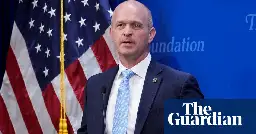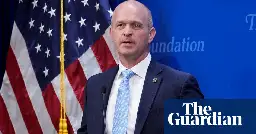Kevin Roberts, architect of Project 2025, has close ties to radical Catholic group Opus Dei
Kevin Roberts, architect of Project 2025, has close ties to radical Catholic group Opus Dei

Kevin Roberts, architect of Project 2025, has close ties to radical Catholic group Opus Dei

Kevin Roberts, the Heritage Foundation president and the architect of Project 2025, the conservative thinktank’s road map for a second Trump presidency, has close ties and receives regular spiritual guidance from an Opus Dei-led center in Washington DC, a hub of activity for the radical and secretive Catholic group.
Roberts acknowledged in a speech last September that – for years – he has visited the Catholic Information Center, a K Street institution headed by an Opus Dei priest and incorporated by the archdiocese of Washington, on a weekly basis for mass and “formation”, or religious guidance. Opus Dei also organizes monthly retreats at the CIC.

